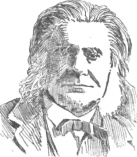HURST goi HUXLEY
Description
This page of the book is from "The New Student's Reference Work: Volume 2" by Chandler B. Beach, Frank Morton McMurry and others.
HURST
goi
HUXLEY
the beaver dived, and brought up earth to make land, where she rested and bore two sons. The son of one of these twins, called Tharonhiawagon, was worshiped by the Hurons and the Iroquois. The tribe was divided into clans, each ruled by a sachem. Their totem was the porcupine. For an Indian tribe their country was very small, rnly about 75 miles long and 25 miles wide. When first met with by the French, they were 30,000 strong, living in 25 towns. In 1609 the French, under Champlain, found the Hurons allied with the Algonquins and fighting the Iroquois. By 1648 the Hurons were so weakened by disease that they fell an easy prey to the Iroquois, who had been given guns by the Dutch. Their towns destroyed, the Hurons scattered, some joining ,the Iroquois, others carried by the French to Quebec. See Kip's Early Jesuit Missions in North America and Chamberlain's Ethnology of the Aborigines in the British Association's Handbook of Canada.
Hurst, John Fletcher, an American divine, and bishop in the Methodist Episcopal church. He was born near Salem, Md., Aug. 17, 1834, and studied theology at Halle and Heidelberg, Germany. He returned to the United States in 1856, and became pastor of various churches until 1866, when he was given charge of the Methodist Missionary Institute at Bremen, Germany. He remained there for three years, and in 1871 again returned to the United States, and was made professor of historical theology at Drew Seminary, Madison, N. J., becoming president in 1873. In 1880 he was elected bishop. In 1891 he became chancellor of the American University (Meth.) at Washington, D. C. He was the author of History of Rationalism; Life and Literature in the Fatherland; Bibliotheca Theologica; Short History of the Reformation; Indika; and History of the Christian Church, He died on May 4, 1903.
Huss or Hus, John, a Bohemian reformer, was probably born in 1369. At the University of Prague he became acquainted with the writings of Wiclif, an English reformer, and in 1408 preached against the abuses of the clergy. His preaching won the people, and nothing stopped him, not even excommunication in 1410. Next year he spoke still more boldly, but nearly all the nobles stood by him. He was later summoned to a church-council at Constance, was imprisoned there in spite of having been promised protection, and in 1415 was illegally tried and condemned." He remained loyal to his evangelical beliefs, and so was burned to death as a heretic on July 6, 1415. His followers held together, finally forming the Unity of Brethren that is commonly called the Moravian (or Bohemian) Brethren, and a century later, when Luther arose, they were a large and powerful body of Evangelical Christians. The writings of Huss, which are Wiclif's, greatly influenced Luther.
Hutch' inson, Anne, a religious leader was born in Lincolnshire, England, about 1590, and murdered by the Indians in Connecticut in 1643. At first her zeal in religious matters met with some sympathy from the Rev. John Cotton; but after a time the famous minister came to dread her leanings to the antinomian heresy, and in 1637 she was excommunicated from his church. Anne Hutchinson and her friends, by permission of the Indians, founded a settlement in Rhode Island, where all differences of religious opinion were to be tolerated. Only after her husband's death did she remove to Stamford, Conn., where she and her family, except one daughter, were massacred. See Life in Library of American Biography.
Hutchinson, a city and county-seat of Reno County, Kan., 40 miles west of Wichita on the Arkansas River. It manufactures lumber, machinery, boilers etc. It is an important meatpacking and shipping point, but its chief business is the salt industry In 1887 rock-salt was discovered here, and 6,000 barrels are now produced daily. Hutchinson has a good public school system, a high school, a public library, the state reformatory and the railroad-shops of the Hutchinson and Southern Railroad. It is served by four railroads. Population 16,-364.
Hut'ton, Maurice, was born in Manchester, England, and educated at Magdalen College School and Worcester College, Oxford. Fellow of Merton College, 1877-80, he lectured on classics and ancient history at Firth College in 1880. He has been professor of Greek since 1887, and principal since 1901, of University College, Toronto.
Hux'ley, Thomas Henry, was born at Ealing, Middlesex, England, May 4, 1825. He studied at the medical school of Char i n g Cross Hospital. After receiving his degree in 184Ŏ, he entered the medical service of the royal navy as assistant surgeon of the Rattlesnake. The staff of this ship surveyed the passage within the great barrier reef skirting the eastern shores of Australia, and explored the sea between the northern end of that reef and New Guinea. Huxley plunged eagerly into the study of the many sea-animals gathered during the survey, and made them the subjects of valuable scientific papers, the most important being The Oceanic Hydrozoa, which was not published until 1859. In 1854 he was made pro-

T. H. HUXLEY.


